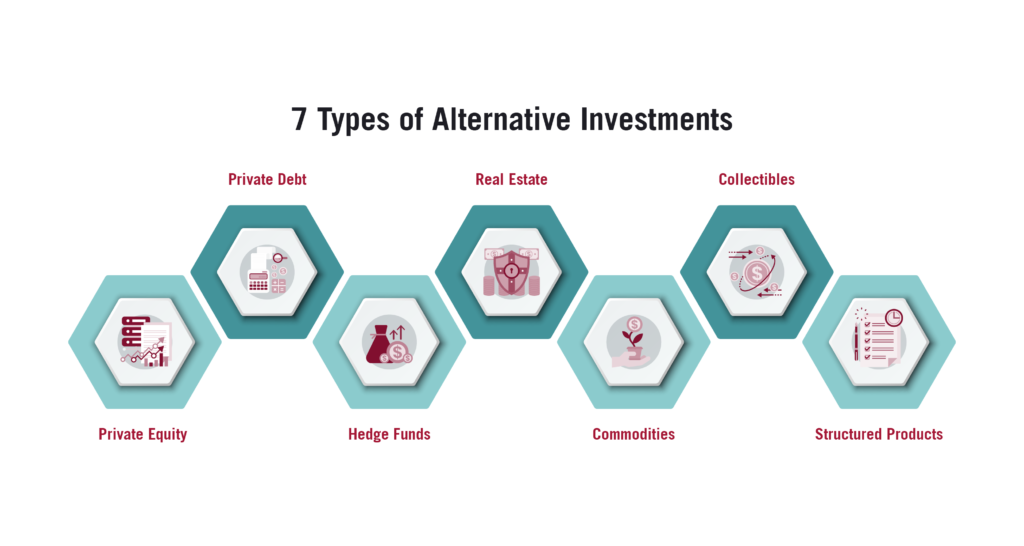Alternative Investments: Understanding Private Real Estate Hedge Funds and Private Equity Investments in Real Estate
Alternative Investments Chart – Harvard Business School

Source: Harvard Business School, 7 Types of Alternative Investments Everyone Should Know7 Types of Alternative Investments Everyone Should Know
As an accredited investor, you have likely heard of alternative investments. While traditional investments such as stocks, bonds, and mutual funds are familiar and accessible to most investors, alternative investments offer a different path to potentially higher returns and diversification.
In this article, we will explore alternative investments in general, and focus on private real estate hedge funds and private equity investments in real estate specifically. We will discuss the benefits and risks of these alternative investments and provide guidance for accredited investors who are considering them.
What are Alternative Investments?
Alternative investments are investments that fall outside of traditional asset classes such as stocks, bonds, and cash. These investments can include private equity, hedge funds, real estate, commodities, and more. Alternative investments are generally less liquid than traditional investments, meaning they cannot be easily bought and sold on public exchanges. Instead, alternative investments are typically held for longer periods of time and often require larger minimum investments.
One of the main benefits of alternative investments is their potential for higher returns. These investments often have a lower correlation with traditional investments, meaning they may not move in tandem with the stock or bond markets. This lack of correlation can provide diversification benefits and potentially reduce overall portfolio risk.
Private Real Estate Hedge Funds

A private real estate hedge fund is a pooled investment vehicle that invests in real estate assets using a variety of investment strategies. These strategies can include purchasing distressed assets, investing in development projects, or acquiring income-producing properties.
Private real estate hedge funds are typically only available to accredited investors, which means they have a net worth of at least $1 million or an annual income of at least $200,000 for the past two years. This requirement is intended to ensure that investors have a certain level of financial sophistication and can withstand the risks associated with alternative investments.
One of the main benefits of investing in a private real estate hedge fund is the potential for higher returns than traditional real estate investments. Hedge funds can employ a variety of investment strategies and may be able to take advantage of market inefficiencies or mispricings to generate higher returns. Additionally, private real estate hedge funds may have access to deals that are not available to individual investors.
However, private real estate hedge funds also come with risks. These funds are often less liquid than traditional real estate investments, meaning that investors may not be able to easily sell their shares or redeem their investment. Additionally, hedge funds may use leverage to magnify returns, which can also magnify losses if the investments do not perform as expected. Finally, hedge funds typically charge higher fees than traditional investments, which can reduce overall returns.
Private Equity Investments in Real Estate

Free Report
Private equity investments in real estate are similar to private real estate hedge funds in that they are typically only available to accredited investors and can offer higher potential returns than traditional real estate investments. However, there are some key differences between the two investment types.
Private equity investments in real estate are typically structured as partnerships between the investors and the investment manager. The investment manager will typically have a target return that they are seeking to achieve over a set time period, such as five to seven years. The manager will use the investor’s capital to acquire real estate assets, improve them through renovations or repositioning, and then sell them at a profit.
Benefits of Private Equity Investments in Real Estate
Private equity investments in real estate can offer accredited investors several benefits that may not be available through traditional real estate investments.
One of the main benefits of private equity investments in real estate is the potential for higher returns than traditional real estate investments. Private equity investment managers typically have a specific target return in mind that they aim to achieve over a set period of time, such as five to seven years. They use investors’ capital to acquire real estate assets, improve them through renovations or repositioning, and then sell them at a profit. This can result in significant gains for investors.
Like private real estate hedge funds, private equity investments in real estate can take advantage of market inefficiencies or mispricings to generate higher returns.
Additionally, private equity investments in real estate may have access to larger or more complex real estate deals than individual investors. Some deals may not be available on the public market, such as off-market deals, which can offer attractive investment opportunities that are not available to the general public. Accredited investors who invest in private equity real estate funds may have access to these types of deals.
Diversification and Private Equity Investments in Real Estate
Another benefit of private equity investments in real estate is the potential for diversification. These investments can have a lower correlation with traditional investments, meaning they may not move in tandem with the stock or bond markets. This lack of correlation can provide diversification benefits and potentially reduce overall portfolio risk.
Additionally, investors in private equity investments in real estate may have a degree of control over the investment. Investors can work with the investment manager to make decisions about the acquisition and management of the real estate assets, giving them a degree of involvement in the investment.
Finally, private equity investments in real estate can offer tax advantages to investors. For example, investors may be able to defer capital gains taxes on their investment until they sell their shares, which can result in significant tax savings.
It is important to note that private equity investments in real estate also come with risks, including the potential for losses and the lack of liquidity associated with these investments. Investors should carefully consider their investment goals and risk tolerance before investing in these types of investments.




